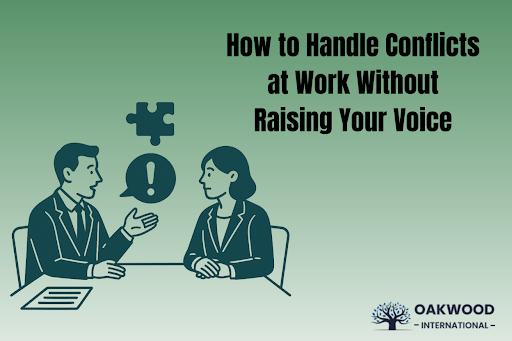Conflict at work is not always loud. It can be a quiet tension, awkward meetings or unread messages left hanging. Professionals working towards the CIPD Level 7 often face these real-world situations head-on. And when it comes to Conflict Management, the real power lies in calm communication. If you are wondering how to handle disagreements without resorting to shouting or walking away, this blog is your guide.
Let us explore how to solve problems without raising your voice and still be respected.
Smart Ways to Manage Conflict Without Raising Your Voice
Calmly handling conflicts is not only kind but also effective. Below are the ways to manage workplace conflict while keeping your voice and emotions in check:
Spot the Conflict Before it Spreads
It is easier to handle a problem if you find it early on. Sometimes, conflict does not appear to be a fight. It could manifest as silence between coworkers or passivity in team discussions. People who want to obtain their CIPD Level 7 qualification learn how to identify these warning signs before things escalate. Be aware of changes in tone or minor misunderstandings. Early detection of tension facilitates resolution, allowing both parties to remain open to discussion and negotiation.
Stay Calm When Emotions Rise
Your tone of voice can influence the entire conversation. Your ability to remain composed becomes your superpower when others grow agitated. Before answering, take a deep breath. Do not change your tone. Avoid defensive or sarcastic remarks. This keeps others from becoming more hostile and gives you a more controlled appearance. The key to success in any conflict management situation is maintaining emotional stability. Additionally, it gives others the confidence to listen and react thoughtfully.
Use Clear Language That Builds Trust
You can be firm without raising your voice. Make use of plain language. Describe the problem, its impact on the team, and the desired outcome. Avoid placing blame or using statements like “you always” or “you never.” Pay attention to the facts. Be truthful but polite. As part of their leadership development, those pursuing the CIPD Level 7 frequently practise these discussions. People react better when you speak fairly and straightforwardly.
Focus on Solutions, Not Fault
It is simple to assign blame. However, smart professionals recognise that identifying a path forward is of more significance. Once the issue is presented, redirect the discussion towards its resolution. Pose enquiries such as, “What solutions might be mutually beneficial?” or “How can we progress from this situation?” This maintains the energy directed towards advancement. Effective conflict management does not revolve around being correct. It is about finding common ground and creating a better work environment.
Listen More Than You Speak
A chance for people to feel heard is sometimes all that is needed in a fight. Take a moment to listen before you speak up to explain your point of view. Let the other person fully explain their point of view. You do not necessarily agree with this. It indicates that you are being respectful. Additionally, people are frequently more inclined to listen back after they feel heard. Many professionals learn this crucial step through CIPD Level 7 training.
Call Out the Issue, Not the Person
Language is important. “You are difficult” is an insult to the individual. The statement “I find our communication unclear lately” indicates a problem. Never pay attention to someone’s personality; instead, concentrate on the behaviour or issue. This keeps the discussion positive and lessens defensiveness. When discussing conflict management, being neutral helps the other person remain open as well.
Know When to Step Back
Not every issue requires immediate resolution. Should tensions escalate, propose a cessation. Propose, “Let us pause and converse in the afternoon”, or “Shall we reconsider this with renewed perspectives tomorrow?” It is not a weakness to pause. It’s a responsible measure to stop additional harm. Everyone can contemplate and come up with better ideas when they take a step back.
Conclusion
Conflicts are part of working life. But shouting is not. Staying calm, using the right words and aiming for solutions all show leadership in action. These are the exact skills that the CIPD Level 7 helps build in HR and business professionals. If you want to grow in your career and manage difficult situations better, a course from Oakwood International could be the next smart step.
Read Also: techinfobusiness.com



